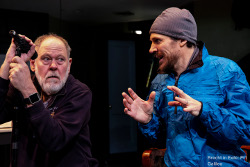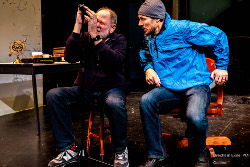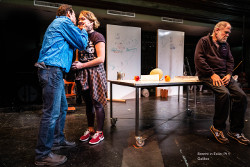
Glenda
Frank
|
"The Life of Galileo"
Feb.
15 – Mar. 9, 2019
"He who does not know the truth when he sees
it is an idiot. But he who knows the truth and chooses to deny it,
he is something much worse. He is a criminal.” The genius of Irondale Ensemble is their understanding of Brecht the iconoclastic artist, the showman, the jokester, the craftsman who loved to interrupt a scene with song. Although his plays speak out against any institution that limits freedom of thought, Brecht can break your heart with the human dilemma – as he does in "Galileo.” Irondale has been experimenting with the Brecht canon since 1984, and while it may have been on a shoestring in the old days, it was always interesting and smart. Really smart! "The Life of Galileo” is the first of a 3-part Bertolt Brecht series Brecht in Exile. Mother Courage and Her Children (1943) and The Good Person of Szechuan (1941) will be presented over the next few seasons. The fluid stage is a large, wide space filled with tables, computers, chairs, microphones, a bowl of fruit, and two tall white flat with a handwritten series of formulae on one and notes about the play on the other. The stage indicates works in progress – the play, Galileo's theories, history itself. The many roles are performed by the four actors in epic acting style and modern dress. The play begins with two of Galileo's obsessions: science and money. Since his salary at the university will not cover his expenses, he reluctantly becomes a tutor to a wealthy student (Michael David Gordon), who tells him of a wonderful new invention that can be bought cheaply in the Dutch marketplace. Soon the sly Galileo (Joey Collins) is hawking an improved telescope to the powers that be as a spy-glass, a tool for spotting enemy ships. He, however, has other designs. He will study the heavens. As he instruct Andrea Sarti (Chantelle Guido), the clever son of the housekeeper (Terry Greiss), he instruct us on the law of gravity using an apple and a pencil. ("You can prove anything with an apple.”) In a few simple discoveries, Galileo has defied the truth of both ancient scientific belief and sociology. The earth, he argues, is not tied to the heavens on a crystal band. And it is not the center of the universe; there are multiple centers – which means lots of room – for thought, for exploration, for discovery and change. By preferring Andrea over his rich tutee, he upsets the whole social order. He opens the revered teaching of Aristotle and the Bible to scientific testing. Thus, his nemesis enters the play – the Church.
Does this seem too challenging? Irondale and Brecht make it highly
theatrical and funny. There is a proverb slam and there are puns.
Copernicus becomes Copper Knickers. The debates with church officials
in Florence and later Rome are spoken into microphones. Galileo
even has a hard rock number -- because he was a superstar during
his life. (Original music written and performed by Sam Harmet, who
is joined on stage by Erica Mancini) Galileo's discoveries were
the talk of the marketplace. Ordinary people were reading about
physics and astronomy. Epic acting – dramatized story telling
by actors – itself is often tongue in cheek. The tall, bearded
Terry Greiss plays Galileo's housekeeper by holding a duster in
her hand. Chantelle Guido plays both Galileo's pious daughter, Virginia,
who is dumped by her fiancé when Galileo is placed under
house arrest, and Andrea, the eager male student, who sneaks Galileo's
manuscript of the Discorsi past the border guards into Holland,
where it is published. Much praise for the pacing, innovations, and creative twists by Director Jim Niesen. All the acting was admirable, but Joey Collins took my breath away after Galileo recanted. He somehow aged 20 years, a broken man ashamed that his sly choice to keep on working had halted scientific progress completely. No one dared discuss physics or publish new papers since the great astronomer had been silenced. Virginia's heartbreak and her father's aren't just words. We witness the toll the punishments exact.
In 1933 Brecht and his family fled Germany, fearing that The Third
Reich would arrest him. As the Nazi army advanced he traveled east
from one Scandinavian country to another, continually writing many
of the masterpieces. As politics changed, he would return to the
plays to create a gloss on events, to sharpen the conflicts. "The
Life of Galileo” was completed in 1938, but rewritten in 1945
after Hiroshima, and again after his return to Germany in 1947.
|
| recordings | coupons | publications | classified |



